Information injection-pump assembly
ZEXEL
106871-3830
1068713830
HINO
220801290A
220801290a

Rating:
Cross reference number
ZEXEL
106871-3830
1068713830
HINO
220801290A
220801290a
Zexel num
Bosch num
Firm num
Name
Calibration Data:
Adjustment conditions
Test oil
1404 Test oil ISO4113 or {SAEJ967d}
1404 Test oil ISO4113 or {SAEJ967d}
Test oil temperature
degC
40
40
45
Nozzle and nozzle holder
105780-8140
Bosch type code
EF8511/9A
Nozzle
105780-0000
Bosch type code
DN12SD12T
Nozzle holder
105780-2080
Bosch type code
EF8511/9
Opening pressure
MPa
17.2
Opening pressure
kgf/cm2
175
Injection pipe
Outer diameter - inner diameter - length (mm) mm 8-3-600
Outer diameter - inner diameter - length (mm) mm 8-3-600
Overflow valve
134424-0820
Overflow valve opening pressure
kPa
127
107
147
Overflow valve opening pressure
kgf/cm2
1.3
1.1
1.5
Tester oil delivery pressure
kPa
157
157
157
Tester oil delivery pressure
kgf/cm2
1.6
1.6
1.6
Direction of rotation (viewed from drive side)
Right R
Right R
Injection timing adjustment
Direction of rotation (viewed from drive side)
Right R
Right R
Injection order
1-8-6-2-
7-5-4-3
Pre-stroke
mm
4.8
4.74
4.8
Rack position
Point A R=A
Point A R=A
Beginning of injection position
Drive side NO.1
Drive side NO.1
Difference between angles 1
Cal 1-8 deg. 45 44.75 45.25
Cal 1-8 deg. 45 44.75 45.25
Difference between angles 2
Cal 1-6 deg. 90 89.75 90.25
Cal 1-6 deg. 90 89.75 90.25
Difference between angles 3
Cyl.1-2 deg. 135 134.75 135.25
Cyl.1-2 deg. 135 134.75 135.25
Difference between angles 4
Cal 1-7 deg. 180 179.75 180.25
Cal 1-7 deg. 180 179.75 180.25
Difference between angles 5
Cal 1-5 deg. 225 224.75 225.25
Cal 1-5 deg. 225 224.75 225.25
Difference between angles 6
Cal 1-4 deg. 270 269.75 270.25
Cal 1-4 deg. 270 269.75 270.25
Difference between angles 7
Cal 1-3 deg. 315 314.75 315.25
Cal 1-3 deg. 315 314.75 315.25
Injection quantity adjustment
Adjusting point
A
Rack position
6.8
Pump speed
r/min
700
700
700
Average injection quantity
mm3/st.
119
117
121
Max. variation between cylinders
%
0
-2
2
Basic
*
Fixing the lever
*
Injection quantity adjustment_02
Adjusting point
B
Rack position
7.3
Pump speed
r/min
1100
1100
1100
Average injection quantity
mm3/st.
134.8
128.8
140.8
Max. variation between cylinders
%
0
-4
4
Fixing the lever
*
Injection quantity adjustment_03
Adjusting point
C
Rack position
7+-0.5
Pump speed
r/min
900
900
900
Average injection quantity
mm3/st.
135
132
138
Fixing the lever
*
Injection quantity adjustment_04
Adjusting point
-
Rack position
4.9+-0.5
Pump speed
r/min
225
225
225
Average injection quantity
mm3/st.
12.6
9.6
15.6
Max. variation between cylinders
%
0
-15
15
Fixing the rack
*
Remarks
Adjust only variation between cylinders; adjust governor according to governor specifications.
Adjust only variation between cylinders; adjust governor according to governor specifications.
Injection quantity adjustment_05
Adjusting point
E
Rack position
6.7
Pump speed
r/min
1175
1175
1175
Average injection quantity
mm3/st.
117.5
107.5
127.5
Fixing the lever
*
Injection quantity adjustment_06
Adjusting point
H
Rack position
6.8
Pump speed
r/min
500
500
500
Average injection quantity
mm3/st.
117.5
114.5
120.5
Fixing the lever
*
Test data Ex:
Governor adjustment
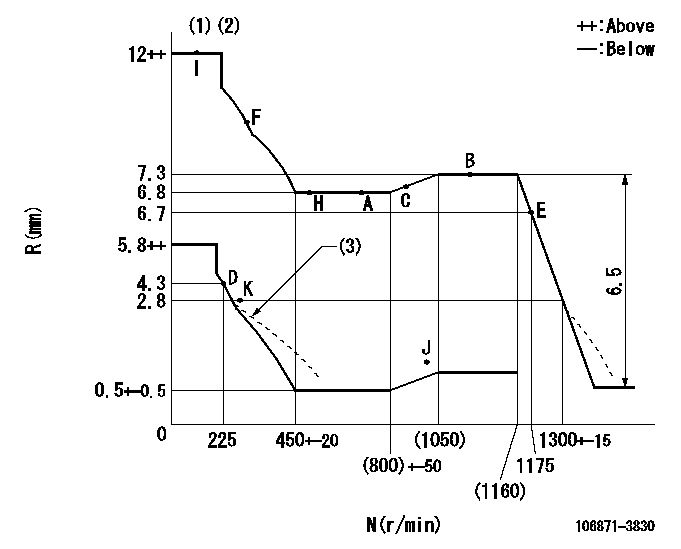
N:Pump speed
R:Rack position (mm)
(1)Lever ratio: RT
(2)Target shim dimension: TH
(3)Damper spring setting: DL
----------
RT=0.8 TH=1.8mm DL=2.8-0.5mm
----------
----------
RT=0.8 TH=1.8mm DL=2.8-0.5mm
----------
Timer adjustment
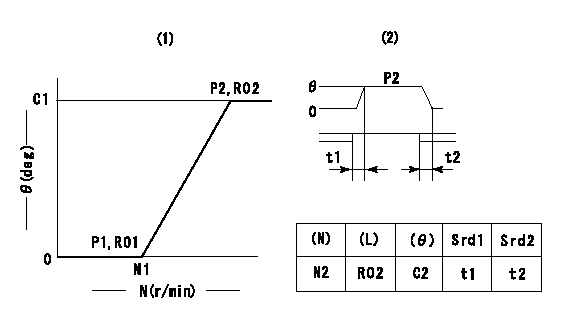
(1)Adjusting range
(2)Step response time
(N): Speed of the pump
(L): Load
(theta) Advance angle
(Srd1) Step response time 1
(Srd2) Step response time 2
1. Adjusting conditions for the variable timer
(1)Adjust the clearance between the pickup and the protrusion to L.
----------
L=1-0.2mm N2=800r/min C2=(7)deg t1=2--sec. t2=2--sec.
----------
N1=950+-50r/min P1=0kPa(0kgf/cm2) P2=392kPa(4kgf/cm2) C1=7+-0.3deg R01=0/4load R02=4/4load
----------
L=1-0.2mm N2=800r/min C2=(7)deg t1=2--sec. t2=2--sec.
----------
N1=950+-50r/min P1=0kPa(0kgf/cm2) P2=392kPa(4kgf/cm2) C1=7+-0.3deg R01=0/4load R02=4/4load
Speed control lever angle
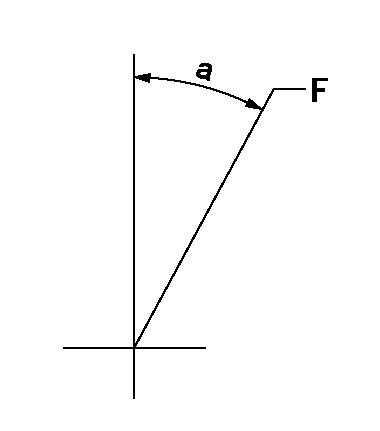
F:Full speed
----------
----------
a=22deg+-5deg
----------
----------
a=22deg+-5deg
0000000901
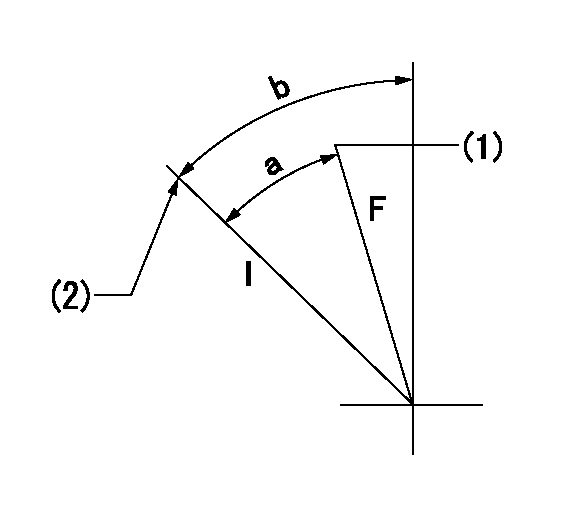
F:Full load
I:Idle
(1)Use the hole at R = aa
(2)Stopper bolt setting
----------
aa=50mm
----------
a=34deg+-3deg b=39deg+-5deg
----------
aa=50mm
----------
a=34deg+-3deg b=39deg+-5deg
Stop lever angle

N:Pump normal
S:Stop the pump.
----------
----------
a=15deg+-5deg b=64deg+-5deg
----------
----------
a=15deg+-5deg b=64deg+-5deg
0000001501 RACK SENSOR
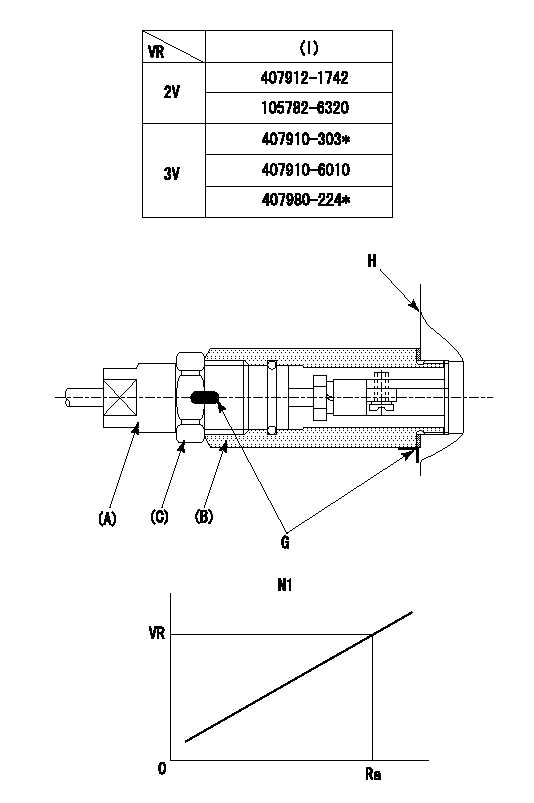
(VR) measurement voltage
(I) Part number of the control unit
(G) Apply red paint.
(H): End surface of the pump
1. Rack sensor adjustment (-0620)
(1)Fix the speed control lever at the full position
(2)Set the speed to N1 r/min.
(If the boost compensator is provided, apply boost pressure.)
(3)Adjust the bobbin (A) so that the rack sensor's output voltage is VR+-0.01.
(4)At that time, rack position must be Ra.
(5)Apply G at two places.
Connecting part between the joint (B) and the nut (F)
Connecting part between the joint (B) and the end surface of the pump (H)
----------
N1=1100r/min Ra=7.3mm
----------
----------
N1=1100r/min Ra=7.3mm
----------
Timing setting
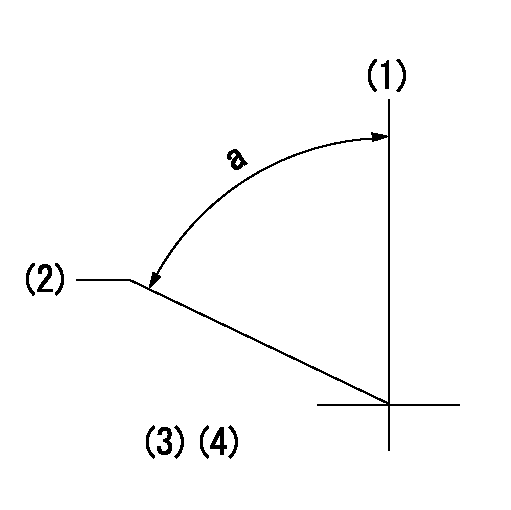
(1)Pump vertical direction
(2)Coupling's key groove position at No 1 cylinder's beginning of injection
(3)-
(4)-
----------
----------
a=(80deg)
----------
----------
a=(80deg)
Information:
The electrical system is a combination of two separate electric circuits: the charging circuit and starting circuit. Each circuit is dependent on some of the same components. The battery (batteries), disconnect switch, circuit breaker, ammeter, cables and wires from the battery are common in each of the circuits.
The disconnect switch must be ON to allow the electrical system to function. Some charging circuit components will be damaged if the engine is operated with the disconnect switch OFF.
The charging circuit is in operation when the diesel engine is operating. The electricity producing (charging) unit is an alternator. An alternator regulator in the circuit senses the state of charge in the battery and regulates the alternator output to keep the battery fully charged.The starting circuit operates only when the disconnect switch is ON and the start switch is actuated.The direct electric diesel engine starting circuit includes a glow plug for each diesel engine cylinder. Glow plugs are small heating elements in the precombustion chambers which promote fuel ignition when the engine is started in low temperatures.The lighting and charging circuits are both connected on the same side of the ammeter while the starting circuit connects to the other side of the ammeter. This alternator is a three phase self-rectifying charging unit.The alternator has four main components: end frame assembly (brush end), rotor assembly, stator and shell assembly, and end frame assembly (drive end).A separate regulator senses the charge condition of the battery as well as electrical system power demand and controls the alternator output accordingly by limiting the field current.
Never operate the alternator without the battery in the circuit. Making or breaking an alternator connection with a heavy load on the circuit will sometimes result in regulator damage.
The starting motor is a device used to rotate the flywheel of an engine fast enough to start the engine. Alternator Charging Circuit
(Negative Ground System Illustrated)
24 VOLT DIRECT ELECTRIC STARTING MOTORThe starting motor used with direct electric start incorporates a solenoid. The action of the solenoid engages the pinion with the ring gear on the engine flywheel, when the solenoid is energized. The pinion always engages before the electric contacts in the solenoid closes the circuit between the battery and the starting motor. An over-running clutch protects the starting motor from being overspeeded. Releasing the start-switch disengages the pinion from the ring gear on the flywheel.A solenoid is a magnetic switch that utilizes low current to close a high current circuit. The solenoid has an electromagnet with a movable core. There are contacts on the end of the core. The contacts are held open by a spring that pushes the core away from the magnetic center of the coil. Low current will energize the coil and form a magnetic field. The magnetic field draws the core to the center of the coil and the contacts close.
The disconnect switch must be ON to allow the electrical system to function. Some charging circuit components will be damaged if the engine is operated with the disconnect switch OFF.
The charging circuit is in operation when the diesel engine is operating. The electricity producing (charging) unit is an alternator. An alternator regulator in the circuit senses the state of charge in the battery and regulates the alternator output to keep the battery fully charged.The starting circuit operates only when the disconnect switch is ON and the start switch is actuated.The direct electric diesel engine starting circuit includes a glow plug for each diesel engine cylinder. Glow plugs are small heating elements in the precombustion chambers which promote fuel ignition when the engine is started in low temperatures.The lighting and charging circuits are both connected on the same side of the ammeter while the starting circuit connects to the other side of the ammeter. This alternator is a three phase self-rectifying charging unit.The alternator has four main components: end frame assembly (brush end), rotor assembly, stator and shell assembly, and end frame assembly (drive end).A separate regulator senses the charge condition of the battery as well as electrical system power demand and controls the alternator output accordingly by limiting the field current.
Never operate the alternator without the battery in the circuit. Making or breaking an alternator connection with a heavy load on the circuit will sometimes result in regulator damage.
The starting motor is a device used to rotate the flywheel of an engine fast enough to start the engine. Alternator Charging Circuit
(Negative Ground System Illustrated)
24 VOLT DIRECT ELECTRIC STARTING MOTORThe starting motor used with direct electric start incorporates a solenoid. The action of the solenoid engages the pinion with the ring gear on the engine flywheel, when the solenoid is energized. The pinion always engages before the electric contacts in the solenoid closes the circuit between the battery and the starting motor. An over-running clutch protects the starting motor from being overspeeded. Releasing the start-switch disengages the pinion from the ring gear on the flywheel.A solenoid is a magnetic switch that utilizes low current to close a high current circuit. The solenoid has an electromagnet with a movable core. There are contacts on the end of the core. The contacts are held open by a spring that pushes the core away from the magnetic center of the coil. Low current will energize the coil and form a magnetic field. The magnetic field draws the core to the center of the coil and the contacts close.